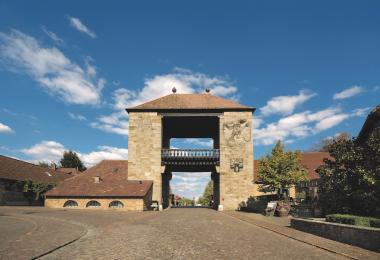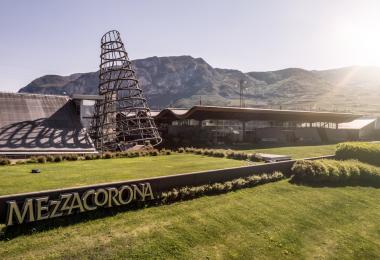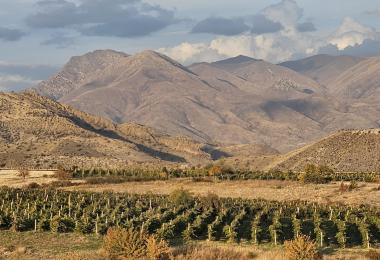Europeans are used to seeing litre bottles on the bottom shelf in the supermarket for just €1.49, marked “Wine from the Republic of North Macedonia, sweet”. But that’s not the true face of North Macedonia, as the small country between Albania, Kosovo, Serbia, Bulgaria and Greece is now called.
There must be a reason why Macedonian wines return home with many gold medals from international competitions recently: a quality revolution going on in this little country in Southeastern Europe.
Its particular treasure is the long lasting, tannic wines from the Vranec grape (known as the “black stallion”), which have recently impressed wine experts from around the world – so much so, that it’s been raining medals at big international competitions like MUNDUS VINI, Decanter and Concours Mondial. Last year the country took home more than 100 medals, a third of which were Gold. At MUNDUS VINI, for example, the Agupka from Bovin, a Vranec made predominantly from grapes raisined on the vine, was awarded Gold in 2019 and Grand Gold in 2018. Another powerful Vranec, Hermes 2015 from Dalvina Winery, took the pedestal at MUNDUS VINI and won the Grand Gold in 2019. One more great success for the Vranec variety last year was a Platinum at the Decanter World Wine Awards for the Barovo red from Tikves Winery, a cru made from Vranec and the equally indigenous Kratoshija grown in vineyards at an altitude of 700 metres.
At ProWein 2020, Wines of Macedonia want to share these wines, alongside other prestigious wines from indigenous varieties. They have recruited top experts to help them out, including Caroline Gilby MW and Peter McCombie MW, who will hold masterclasses in English to give an overview of wines from North Macedonia. Thomas Brandl will present the best Vranec wines at a German-language tasting session at the Meininger stand.
The black stallion
The name Vranec essentially means ‘black stallion’, signalling a wine with power, strength and spirit. Vranec wines are characterised by their very deep colour, dark berries, spicy notes, firm tannin structure and strong acidity, which ensures longevity. In North Macedonia, Vranec is cultivated on 10,800 ha, around one third of the country’s vineyards. This is a significantly higher figure than in Serbia, Bosnia-Herzegovina, Kosovo and Montenegro, the home of Vranec.
The association “Wines of Macedonia” (WOM) organized the 1st Vranec World Day, held on 5 October 2019 in Skopje, the capital of North Macedonia. At the opening, Prime Minister Zoran Zaev called Vranec “an integral part of the common identity of the Balkan countries – and we now want to put that on the world map”. The newly founded Balkan Wine Network also includes partners in Serbia, Montenegro, Albania, Kosovo, Bulgaria and Bosnia-Hercegovina.
Svetozar Janevski, President of Wines of Macedonia and co-owner of the largest producer, Tikveš, considers the rise of Barolo over the past 35 years to be a role model: “Back then, they stood where we are now. And we are eager to be present the second edition of Vranec World Day in the first week of October 2020.”
In the run-up to the 1st Vranec World Day, an international group of journalists was given the opportunity to assess the progress being made with Vranec and its friends – Vranec is not the only interesting indigenous variety from the Balkan region. The others include Stanushina, Kratoshija Prokupac, Plavac, Temjanika and Smederevka. Most of the wines tasted came from wineries created in the 21st century, often born from former state-owned companies that had been privatised.
The industry consists of big operators as well as smaller companies and boutique wineries. They have all invested in modern technology and advanced practices in vineyard management - and yet more than 90% of the grapes remain hand harvested. The fact that Puklavec & Friends, a family business from Slovenia, has invested heavily in a brand-new winery in the deep south of former Yugoslavia shows the great potential of the vineyards.
The terroir
The Republic of North Macedonia may be a young country that only emerged in 1991 after the breakup of Yugoslavia, but it has a long history. Archaeological findings show that an ancient European civilisation flourished in Macedonia between 7000 and 3500 BC. The ancient Macedonians were ethnically, linguistically and culturally distinct from their neighbours – the wine-making tradition of the ‘Pearl of the Balkans’ goes back well over 4,000 years.
However, North Macedonia is still one of the last undiscovered wine countries in Europe: a natural paradise of vineyards, mountains, lakes and rivers, in which life has a different rhythm, amid the grandeur of rich historical ruins and idyllic villages that have remained practically unchanged. From Skopje to Veles, Negotino, Kavadarci and Demir Kapija, as well as Gevgelija on the border with Greece, the roads are lined with wine-growing districts and numerous wineries that authentically narrate the thousands of years of history that are inseparable from these areas.
Mountainous North Macedonia lies on the boundary between the Mediterranean and continental climates, with warm, dry summers featuring temperatures of up to 45C, and mild autumn months and relatively stable winters. The central wine region of Vardar River Valley is one of the driest in Europe. Annual rainfall there is between 440 and 740 mm.
The main challenge faced by the “Wines of Macedonia” association, founded in 2010, is to help the country acquire the recognition as a quality wine producer that it has long deserved. Achieving this involves holding joint promotional events and participating in leading international trade fairs such as ProWein in Düsseldorf. Sixty percent of Macedonian wine is still sold as bulk, and the Yugoslavian successor countries of Serbia, Croatia, Bosnia and Herzegovina and Slovenia continue to dominate in terms of the destination of bottled wine exports – followed by China, Russia, Germany, and the USA. Eighty-five percent of the wine produced by the 74 registered wineries, covering an area of over 28,000 ha, is exported to 38 countries.
The wineries
All 12 businesses that will be present on the Wines of Macedonia stand in hall 15 G21 at ProWein 2020 have made major investments in the latest cellar and vineyard technology in recent years, and now produce wines of the highest international standard.
The market leader and oldest cellar Tikveš, for example, which was founded in 1885 and is now owned by a local group of investors headed by Svetozar Janevski, has had more than €40m invested in it over the past 15 years. Around 16m litres of wine and 4m litres of brandy are currently produced from the 1,000 ha of vineyards run directly by the company, with an additional area of nearly 7,000 ha farmed by contracted grape growers, managed and guided by the winery. Their premium portfolio Tikves Chateaux and Domaines consists of wines from their best terroirs form Bela Voda, Barovo and Domain Lepovo in North Macedonia and Chateaux de Gourdon in Southern Rhône in France. The cellar master Marko Stojaković, trained in Bordeaux and Montpellier and advised by the French star oenologist Philippe Cambie, has reduced the hectare yield in recent years in order to achieve the quality associated with international recognition.
A lot of money has also been invested at Stobi – a modern winery established in 2009. Six hundred hectares are currently cultivated at Stobi, resulting in a total production of 4.5m litres. It is no surprise that the barrique cellar, with its 700 oak barrels, is arranged in the form of an amphitheatre, featuring original coins from the archaeological site. This has been done to create modern cellars and an award-winning wine tourism centre. Two thirds of the wine produced by Stobi is red, with around 50% of this being Vranec. Credit where credit is due: the top cuvée Aminta, a blend of Vranec, Cabernet Sauvignon and Merlot, is dedicated to the grandfather of Alexander the Great. Stobi has a wide portfolio containing wines that have conquered the hearts of Russian, Chinese and American customers.
At around two million litres, the production of Bovin in Negotino is around half the size of that at Stobi. The focus is on the Vranec grape variety here as well, which is available in seven different bottled versions. In particular, the top Vranec wines A’gupka, Era and My Way have caused a sensation on the international stage and have won a succession of Gold and Grand Gold medals in various competitions. Bovin Winery has stood as a synonym for top-quality wines in Macedonia for more than two decades. The company was founded in 1998 by the Bogevski family as the first privately family owned winery in the country, putting the stamp of the new era of the wine industry and opening the way for other wineries. It now exports its wines and brandies to 38 countries around the world.
There is also a focus on exports at Kamnik, which is a family boutique winery with 17 ha of vines. More than 20 different varieties are cultivated, and the planting density of 5,500 vines per hectare is high, as are the quality requirements of the owner, Ilija Malinkovski. In 2004, he founded the winery on the hills of the capital Skopje and has since then left nothing to chance. All the grapes are harvested by hand and refined in the cellar by the enthusiastic oenologist Sandra Georgievska, to create internationally sought-after top vintages. Seventy percent of the production is exported to countries such as Japan, Denmark, Singapore and the USA. Kamnik always sees itself as being a bit avant-garde: the first rosé sparkling wine was launched in 2016, the first Macedonian Orange wine arrived in 2017 and the first organic Vranec came out in 2019.
The Dalvina winery, located in the east of the country in the Strumitsa-Radovish wine district, founded in 2006, has 370 ha of vines and a total capacity of 5m litres. Dalvina is a family-owned business and uses state-of-the-art technology to produce high-quality bottled wines that are exported to Europe, Japan and China. Their main aenologist, a famous professor in the Balkans, Professor. Dr Goran Milanov, significantly increased the quality level of Dalvina wines, which resulted in them winning plenty of major wine awards in the last two years.
In contrast, Popov winery, with 55 ha, is a smaller family business and owns vineyards in the two micro-locations of Smolnik and Vrshnik, which are planted with 13 different varieties. The main grape is Merlot, but the indigenous varieties Vranec and Temjanika have also been planted recently. With 1,000 square meters of underground cellar and more than 300 barrels, Popov is still one of the leaders in production of barrique wines in Northern Macedonia. Fifty percent of their red wines go through ageing in American, French and Macedonian barriques.
At the Venec winery, which was established in 1956 as an agricultural company mainly for grape growing, bulk wine still accounts for 50%, but this figure is expected to decrease significantly in the medium term. Since 2016, the winery has been completely reconstructed and modernized, increasing the capacity to 550,000 litres and processing only 10% to 15% of its own grapes, with the rest sold to the other Macedonian wineries. Venec makes use of indigenous grapes: 100 ha of the total 420 ha consist of Vranec and the white Smederevka. All the grapes are grown in the best terroirs, planted 250 to 650 meters above sea level, and only the best are used for the three series Classic, Single Block and Terroir, with Vranec Orle, Temjanika Koria and Chardonnay Oak Plus.
The Ezimit winery in the Ovce Pole wine district outside of Shtip, founded in 1991, has vineyards covering over 400 ha. Over 30 different grape varieties are planted, ranging from Vranec and Kratoshija to Pinot Grigio and Sauvignon Blanc. It was Macedonia’s first winery to plant its own vineyards of Viognier and Plavac. As a 100% export-oriented winery, their main market is Croatia, but they have been working as well with the monopolies in Sweden, Finland and Canada. The motto here is, “Excellent quality at a good price”.
Also located in Shtip, Ovce Pole wine district, is Imako Vino winery, which was established in 2002 and is one of the largest wineries today with an annual production of over 10m litres of wine. Using grapes from 650 ha of vineyards, Imako produces wines from indigenous and international varieties. The winery combines contemporary winemaking technologies with creativity and knowledge, to produce authentic wines for different product segments. Recent endeavours include the production of more premium wines, from micro-locations near the winery. These are wines that are created with the greatest attention to detail and aged in oak barrels. In 2019, an additional 150 ha of land was acquired, and will be planted with new vines to produce premium wines. Imako is one of the first wineries in the country to produce fortified sweet wines from Vranec and has demonstrated the potential of Vranec to produce wines of this style.
At Movino, founded in the Tikveš wine district in 2015, production is focused on bulk wine, with a capacity of 5.3m litres. They have also launched quality bottled wines featuring oak-matured Vranec, Chardonnay, and Rkatsiteli. The winery will continue to expand its bottled segment, alongside its bulk production. While Germany is Movino’s main market, it exports to countries throughout Europe, Asia, and Canada.
The wine cellar Skovin was founded in 1979 and is a devoted follower of old wine production traditions of the Skopje region, which dates back to Roman times. The vineyards are 400-600 metres above sea level at the southern slopes of the hill Vodno around Skopje, covering an area of 500 ha in Sonceva dolin and Markova reka. Skovin also owns 150 ha in Tikvesh. Currently Skovin is the third largest producer in the country, with a capacity of 17m litres per year, which are sold on world markets. Now, 40 years after it was founded, Balkan Holding – which invested in the business in October 2019 – is making the giant fit for the future. The new Winery Skovin Group produces a range of wines, including the premium Markov Manastir and Scupi Cuvee.
The Macedonian branch of the successful wine company Puklavec Family Wines from Slovenia focuses on the premium segment. Red wines stored in oak barrels, consisting of Vranec, Merlot and Cabernet Sauvignon, are produced on 20 ha of sunny hills-in the Disan micro region. These wines are served on board KLM and Virgin Atlantic. The director of Puklavec Macedonia is the renowned oenologist Dane Jovanov, who has helped other businesses in the country to develop.
This article first appeared in Issue 1, 2020 of Meininger's Wine Business International magazine, available by subscription in print or digital.








